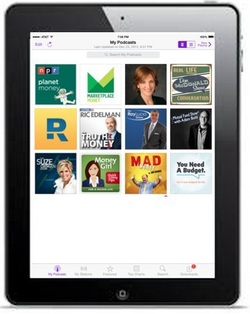
Significant changes in the sonic landscape of money talk in 2013 have gone without much comment during this, the season when year-in-review pieces take up space usually reserved for news or, at least, fresh commentary.
Public radio gave us some of the best work all year. NPR's Planet Money team produced an ambitious bit of original enterprise reporting on their own Planet Money T-shirt. It is a remarkable piece of journalism. Funded through a Kickstarter campaign, the series followed the process of making of an ordinary piece of clothing around the world a couple of times before the used Ts end up sold in bulk in the global rag trade. Fabulous storytelling, rich detail and surprising economic lessons - even and especially through the false starts.
Public radio gave us some of the best work all year. NPR's Planet Money team produced an ambitious bit of original enterprise reporting on their own Planet Money T-shirt. It is a remarkable piece of journalism. Funded through a Kickstarter campaign, the series followed the process of making of an ordinary piece of clothing around the world a couple of times before the used Ts end up sold in bulk in the global rag trade. Fabulous storytelling, rich detail and surprising economic lessons - even and especially through the false starts.
For its part, American Public Media (APM) named former CNBC host and Money magazine writer Carmen Wong Ulrich as the host of its weekly personal finance show and podcast, Marketplace Money. Wong Ulrich began in November, bringing a more first person expert approach to listener questions and features about money. Still at APM, a shout out to Kai Ryssdal who anchors the flagship Marketplace broadcast each evening. Clever writing and storytelling makes the day's financial news make sense, and Ryssdal and company often find a counterintuitive way into otherwise arcane issues.
Things were both louder and messier on commercial radio. Talk about money has been going through changes for some time now, wrought by both the firmer enforcement of financial regulations and the fluid environment of radio syndication.
With notable exceptions, old school syndication where the financial show host was an employee of a station or network has largely given way to self syndication where stations and financial entrepreneurs split the available minutes in the commercial breaks of a show and sell them through their respective sales organizations. Self syndication is increasingly being squeezed out by the informercial model where the financial entrepreneur buys the whole time block. That's the model used by Ric Edelman and Adam Bold's Mutual Fund Show among others.
Even as the underlying business models changed, the larger-than-life personalities behind some prominent money talk brands were attracting attention, and not always the kind they liked.
The Ray Lucia Show: Namesake Ray Lucia Sr. ran afoul of the Securities and Exchange Commission this year. In July, the SEC charged the "nationally syndicated radio personality and financial advice author for spreading misleading information about his 'Buckets of Money' strategy at a series of investment seminars that he and his company hosted for potential clients."
The Suze Orman Show: The shine came off the vertically integrated personal finances brand named Suze - which includes books, kits, online calculators, a pre-paid debit card, PBS fund drive specials and a weekend show on CNBC - over her handling of the controversy around "The Approved Card from Suze Orman." It did not, it could not, do what it promised to do - that is, improve your credit score because credit bureaus don't score on debit cards. She got defensive. And things got ugly.
The Dave Ramsey Show: An explosive year of growth for the man from Brentwood, Tennessee. His show was the first of the big syndicated talkers - including political talk - to score a dedicated channel on the iHeart Radio app. What's more, the show launched an HD video channel to loop the daily broadcast 24 hours a day online and through an ITunes app. The undisputed king of debt reduction became a disputed purveyor of investing advise, which figures prominently in both Ramsey's Endorsed Local Provider (ELP) program and a new class called Living a Legacy. The year was also marked by losses. The show lost its spot on XM satellite radio and Ramsey's endorsement of the PerkStreet rewards debit card turned embarrassing when the Boston-based start-up abruptly closed its doors in August. Ramsey also lost prominent company executive Chris LoCurto and personality Jon Acuff this year. The latter's departure was sudden and under explained, although Internet speculation suggests it likely had to do with control over intellectual property. As for 2014, look for a rebranding of company offerings as Ramsey Solutions.
Jill on Money: Jill Schlesinger's weekly show is among the notable exceptions in radio syndication (see above). The weekend show, which airs in 80 markets, remained constant this year but her day job changed when CBS sold MoneyWatch.com where Schlesinger served as Editor-at-Large. She has been recast as the Business Analyst for CBS News across the company's platforms.
The Don McDonald Show: A pioneering voice in financial talk, McDonald's first money talk show appeared in 1988 and had a national run for more than a decade. McDonald, who became a principal in an investment advisory firm in the interim, brought the show back from its extended hiatus in September, 2013. But he was forced to declare the radio comeback a failed experiment just four months later, announcing the show's last show would air on January 4, 2014. McDonald is the most eccentric and eclectic of the current money talk hosts but his core message was simple - own the world economy through low-cost passive investing.
Off course, all these broadcast shows double as podcasts in a pretty crowded online world of financial talk that shares many of the strengths and weaknesses of their terrestrial and cable counterparts. But there is one podcast that deserves mention here - You Need a Budget. Named for the personal finance software created by former CPA turned software entrepreneur Jesse Mecham. The infrequent and irregular podcast features Mecham's musings about personal finances, the YNAB method and surprisingly candid observations about his own company.
These hosts do not agree on much - except maybe that we are going to have to work longer than we want to in order to afford our retirement. But cherry picking across the good ones above, there are two themes that are the stuff of new year's resolutions. First, manage your financial life with low or no debt. Second, invest broadly and inexpensively through low cost index mutual funds. And if the voices on the radio (or in your iPod) confuse you, there is always the definitive little book on the subject.
Things were both louder and messier on commercial radio. Talk about money has been going through changes for some time now, wrought by both the firmer enforcement of financial regulations and the fluid environment of radio syndication.
With notable exceptions, old school syndication where the financial show host was an employee of a station or network has largely given way to self syndication where stations and financial entrepreneurs split the available minutes in the commercial breaks of a show and sell them through their respective sales organizations. Self syndication is increasingly being squeezed out by the informercial model where the financial entrepreneur buys the whole time block. That's the model used by Ric Edelman and Adam Bold's Mutual Fund Show among others.
Even as the underlying business models changed, the larger-than-life personalities behind some prominent money talk brands were attracting attention, and not always the kind they liked.
The Ray Lucia Show: Namesake Ray Lucia Sr. ran afoul of the Securities and Exchange Commission this year. In July, the SEC charged the "nationally syndicated radio personality and financial advice author for spreading misleading information about his 'Buckets of Money' strategy at a series of investment seminars that he and his company hosted for potential clients."
The Suze Orman Show: The shine came off the vertically integrated personal finances brand named Suze - which includes books, kits, online calculators, a pre-paid debit card, PBS fund drive specials and a weekend show on CNBC - over her handling of the controversy around "The Approved Card from Suze Orman." It did not, it could not, do what it promised to do - that is, improve your credit score because credit bureaus don't score on debit cards. She got defensive. And things got ugly.
The Dave Ramsey Show: An explosive year of growth for the man from Brentwood, Tennessee. His show was the first of the big syndicated talkers - including political talk - to score a dedicated channel on the iHeart Radio app. What's more, the show launched an HD video channel to loop the daily broadcast 24 hours a day online and through an ITunes app. The undisputed king of debt reduction became a disputed purveyor of investing advise, which figures prominently in both Ramsey's Endorsed Local Provider (ELP) program and a new class called Living a Legacy. The year was also marked by losses. The show lost its spot on XM satellite radio and Ramsey's endorsement of the PerkStreet rewards debit card turned embarrassing when the Boston-based start-up abruptly closed its doors in August. Ramsey also lost prominent company executive Chris LoCurto and personality Jon Acuff this year. The latter's departure was sudden and under explained, although Internet speculation suggests it likely had to do with control over intellectual property. As for 2014, look for a rebranding of company offerings as Ramsey Solutions.
Jill on Money: Jill Schlesinger's weekly show is among the notable exceptions in radio syndication (see above). The weekend show, which airs in 80 markets, remained constant this year but her day job changed when CBS sold MoneyWatch.com where Schlesinger served as Editor-at-Large. She has been recast as the Business Analyst for CBS News across the company's platforms.
The Don McDonald Show: A pioneering voice in financial talk, McDonald's first money talk show appeared in 1988 and had a national run for more than a decade. McDonald, who became a principal in an investment advisory firm in the interim, brought the show back from its extended hiatus in September, 2013. But he was forced to declare the radio comeback a failed experiment just four months later, announcing the show's last show would air on January 4, 2014. McDonald is the most eccentric and eclectic of the current money talk hosts but his core message was simple - own the world economy through low-cost passive investing.
Off course, all these broadcast shows double as podcasts in a pretty crowded online world of financial talk that shares many of the strengths and weaknesses of their terrestrial and cable counterparts. But there is one podcast that deserves mention here - You Need a Budget. Named for the personal finance software created by former CPA turned software entrepreneur Jesse Mecham. The infrequent and irregular podcast features Mecham's musings about personal finances, the YNAB method and surprisingly candid observations about his own company.
These hosts do not agree on much - except maybe that we are going to have to work longer than we want to in order to afford our retirement. But cherry picking across the good ones above, there are two themes that are the stuff of new year's resolutions. First, manage your financial life with low or no debt. Second, invest broadly and inexpensively through low cost index mutual funds. And if the voices on the radio (or in your iPod) confuse you, there is always the definitive little book on the subject.

 RSS Feed
RSS Feed